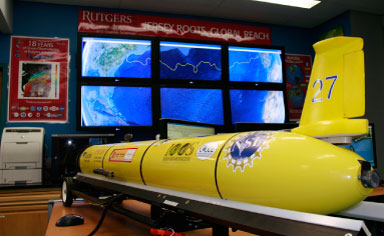The
Rutgers University Coastal Ocean Observing Lab
(RU COOL) was established by Dr. Scott Glenn on the Rutgers campus in 2001. The lab features hands-on, team-based
research projects that complement course work and are specifically designed to engage students throughout their
undergraduate careers. In the COOL room – also known as the collaboratory – scientists, graduate students, and
undergraduates maintain the observatory with 24-hour shift rotations. “Our students work in a modern ocean
observatory every day,” says Scott. "By moving the observatory to campus we made a big step in ocean education."
The observatory was previously located in Tuckerton, New Jersey, a field site over an hour's drive away. "Back then
if we had three undergraduates in the lab we thought it was the greatest thing on Earth," says Scott. "Today we have
50. The number of undergraduate classes have had to increase because there's so much demand. Students are looking for
these activities, they feel very involved and are very excited about it. We want them to have that same thrill we have
every time we go to sea."
Radar and satellite data are collected and analyzed, forecast models direct ship and glider operations using a wireless
network throughout the world. Undergrads learn how to explore data and use them to answer questions. "With ocean
observatories we can show kids that new things still need to be done, there is still a lot to be discovered, and that
they can be part of scientific process and scientific enterprise," says Scott. Working in the COOL room also teaches
them to be collaborative. "It takes a lot of different kinds of scientists to undertake these problems,” says Scott.
"This experience changes their perception of what an oceanographer looks like."
"The students follow the cognitive apprenticeship learning model: Watch one, Do one, Teach one." |
As beneficial as the COOL room is for students, it also benefits scientists like Scott Glenn. "You can't just
advertise in the newspaper for people with experience in ocean observatories," he says. "You have to train them on
the job. The undergrads are part of our research. We can't do it without them." Scott’s long-term vision for ocean
observatories has always included growth. "When we first started our well-sampled ocean was just a few kilometers,
a little postage stamp on the globe. We grew it step by step, and now we are thinking about how to build a basin-scale
observatory. We always knew we’d be scaling up and we always knew we’d need more people."




